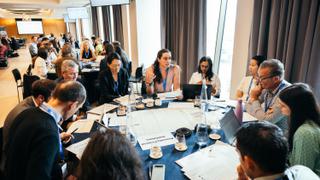During London Climate Action Week 2025, Climate Arc (Arc) convened over 140 technical leads from non-profit organizations, financial services, philanthropy, national governments, corporate sectors and global alliances for a focused session: More Than Metrics - Enriching Transition Data for Better Decisions.
The purpose was clear—unpack the persistent gaps in transition analysis, share emerging solutions, and identify high-impact actions that can help us all make better decisions on the journey to net zero.

Collaboration in practice
Thematic and strategic partners joined forces with Arc to drive the discussions across this hands-on working session, bringing their collective expertise to bear on the most urgent and unresolved questions in transition analysis. Together we explored:
- Linking corporate and national transition plans: How can we align corporate transitions with national strategies?
- Localized pathways: How can transition analysis better reflect the real-world constraints and opportunities playing out across different geographies?
- Redefining climate governance: What does “credible” governance actually look like in a corporate transition — and how do we measure it meaningfully?
- Food and agriculture pathways: How do we credibly assess company progress on transition in a sector where climate is inextricably linked to broader nature and social dimensions?
- Assessing financial institutions: How do we know what ‘good looks like’ for transition progress in the financial sector?
- Integrating physical risk, adaptation and resilience: What does it take to bring physical climate risk and adaptation planning into the heart of transition analysis?
- Strengthening the climate data ecosystem: How can we optimize the collection, sharing, and analysis of data to support decision-making and accelerate financing for credible transitions?
The conversations surfaced key challenges—fragmented systems, inconsistent metrics, uncertain pathways—and the need for reliable data that is both globally coherent and locally meaningful. The outcome summary, now available, reflects a community-wide commitment to advancing actionable solutions.
Read the 'More Than Metrics' report
Explore new opportunities for decision-useful data and find out how to be part of the next phase of Arc’s work.
Key themes and insights
Across intensive discussions and breakout sessions, four overarching themes emerged:
- Interoperable, decision-useful data: Workshop participants emphasized the critical need for transition analysis tools that deliver transparent, interoperable data. Reliable metrics must guide real-world decisions across fragmented systems, supporting enhanced clarity and usability.
- Contextual pathways: The outcomes underscored the importance of localization—benchmarks and transition scenarios tailored to countries, sectors, and commodities. Solutions must be rooted in local realities and developed collaboratively with stakeholders to ensure credible, meaningful progress.
- Governance and accountability: Effective climate governance requires a shift beyond compliance. Genuine leadership, boardroom engagement, and clear accountability are necessary to drive meaningful climate strategies and embed transition goals at all organizational levels.
- Building business resilience: As climate risks intensify, embedding adaptation and resilience into transition planning becomes essential. Comparable, quantifiable data on risk and adaptation actions will play a pivotal role in long-term value creation and robust risk management.

What’s next?
The outcomes of More Than Metrics have the power to inform how best to take the next steps forward to sharpen how we assess progress, target influence, and support real economy change.
Arc will continue to work with partners and aligned collaborators to integrate the priority actions identified through the discussions into existing and upcoming workstreams, particularly through the ongoing development of frameworks, methodologies, and data that power Arc’s transition analysis tools, including TransitionArc and ResilienceArc.
Priorities include refining sectoral frameworks, embedding local context, building mechanisms to strengthen data interoperability and fortifying partnerships to deliver decision-ready insights for financial decision-makers.
Arc remains committed to fostering collaboration across the transition finance ecosystem. By working together, sharing knowledge, aligning standards, and amplifying practical solutions—we can accelerate progress towards a more resilient, low-carbon economy.
Want to stay in the loop?
Sign up to Arc’s newsletter or contact us directly with any questions.




